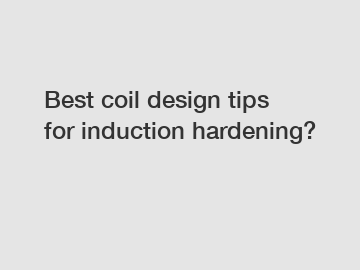Best coil design tips for induction hardening?
Best coil design tips for induction hardening? The key to successful induction hardening lies in the design of the coil. A well-designed coil can ensure uniform heating, precise control of the heat zone, and efficient energy transfer. In this article, we will explore some important tips for designing the best coil for induction hardening.
First and foremost, the shape and size of the coil play a crucial role in the induction hardening process. A coil that closely matches the shape of the part to be hardened will provide better heat distribution and improved surface hardness. Additionally, the size of the coil should be chosen according to the size of the workpiece and the desired hardening depth. A larger coil may be necessary for larger parts or for achieving deeper hardening.
Another important factor to consider is the spacing between the coil and the workpiece. The gap between the coil and the part should be carefully controlled to ensure optimal heat transfer. Too small of a gap can cause uneven heating and hot spots, while too large of a gap can result in inefficient energy transfer. It is recommended to use a spacer or shim to maintain a consistent gap between the coil and the workpiece.

Furthermore, the material of the coil also plays a significant role in the induction hardening process. Copper coils are commonly used for their excellent electrical conductivity and high thermal efficiency. However, depending on the specific application, other materials such as silver or brass alloys may be more suitable. The choice of coil material should be based on factors such as heat resistance, conductivity, and cost-effectiveness.
In conclusion, investing time and effort into designing the best coil for induction hardening can significantly improve the quality and efficiency of the hardening process. By considering factors such as coil shape, size, spacing, and material, manufacturers can achieve uniform heating, precise control of the heat zone, and increased productivity. With the right coil design, induction hardening can be a cost-effective and reliable heat treatment solution for a wide range of industrial applications.
For more information, please visit industrial induction heating system, plane cutter high frequency quenching machine, high frequency induction hammer quenching machine.
195
0
0

Comments
All Comments (0)